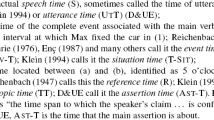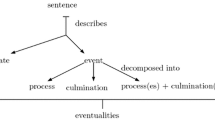Abstract
This paper develops a unified analysis for the meaning of imperfective aspect that covers progressives, habituals, and counterfactuals, aiming at an understanding of two crosslinguistically frequent syncretisms: one between progressives and habituals, and one between habituals and counterfactuals. I first discuss progressive and habitual readings in detail, identifying mereological, temporal, and modal ingredients in both interpretations. My claim is that the temporal and modal ingredients are the same, and I propose to differentiate these readings in terms of verbal plurality: progressives are about singular events, and habituals are about plural events. I then extend the analysis to stative predicates, which I analyze as uncountable mass-like verbal predicates, noticing that imperfective statives tend to be formally similar to imperfective habituals. This paves the way to an analysis of the role of habitual morphology in counterfactuals. I argue that the imperfective operator is attached to a modal/stative predicate in these constructions, and that counterfactuals are about world states holding at the utterance time.
Similar content being viewed by others
References
Anand, P., and Hacquard, V. 2010. The role of the imperfect in Romance counterfactuals. Proceedings of Sinn und Bedeutung 14, pp. 37–50. Vienna: University of Vienna.
Arregui, A. 2005. On the accessibility of possible worlds: The role of tense and aspect. PhD thesis, University of Massachusetts at Amherst.
Arregui A. (2007) When aspect matters: The case of would-conditionals. Natural Language Semantics 15(3): 221–264
Arregui A. (2009) On similarity in counterfactuals. Linguistics and Philosophy 32: 245–278
Arregui A., Rivero M.L., Salanova A. (2014) Cross-linguistic variation in imperfectivity. Natural Language and Linguistic Theory 32(2): 307–362
Bach E. (1986) The algebra of events. Linguistics and Philosphy 9: 5–16
Beaver D., Clark B. (2003) Always and only: Why not all focus sensitive operators are alike. Natural Language Semantics 11: 323–362
Bhatt, R. 1999. Covert modality in non-finite contexts. PhD thesis, University of Pennsylvania.
Bhatt, R., and R. Pancheva. 2005. The syntax and semantics of aspect. Cambridge, MA: Handout at LSA Institute, summer 2005.
Bjorkman, B., and Halpert, C. 2013. In search of (im)perfection: the illusion of counterfactual aspect. In Proceedings of NELS 42, vol. 2, ed. S. Kleine and S. Slogett, 67–78. Amherst, MA.: GLSA.
Boneh, N., and E. Doron. 2013. Hab and Gen in the expression of habituality. In Genericity, ed. A. Mari, C. Beyssade, and F. del Prete, 176–191. Oxford: Oxford University Press.
Bonomi A. (1997) Aspect, quantification and when-clauses in Italian. Linguistics and Philosophy 20: 469–514
Carlson, G. 1989. The semantic composition of English generic sentences. In Properties, types, and meaning, ed. G. Chierchia, B. Partee, and R. Turner, 167–191. Dordrecht: Kluwer.
Chierchia, G. 1998. Plurality of mass nouns and the notion of ‘semantic parameter’. In Events and grammar, ed. S. Rothstein, 53–103. Dordrecht: Kluwer.
Cipria A., Roberts C. (2000) Spanish imperfecto and preterito: Truth conditions and aktionsart effects in a situation semantics. Natural Language Semantics 8: 297–347
Comrie B. (1976) Aspect. Cambridge University Press, Cambridge
de Swart H. (1996) Meaning and use of not... until. Journal of Semantics 13: 221–263
de Swart H. (1998) Aspect shift and coercion. Natural Language and Linguistic Theory 16: 347–385
del Prete, F. 2013. Imperfectivity and habituality in Italian. In Genericity, ed. A. Mari, C. Beyssade, and F. del Prete, 222–249. Oxford: Oxford University Press.
Deo A. (2009) Unifying the imperfective and the progressive: Partitions as quantificational domains. Linguistics and Philosophy 32: 475–521
Deo A. (2014) The semantic and pragmatic underpinnings of grammaticalization paths: The progressive to imperfective shift. Semantics and Pragmatics 8: 1–52
Dowty D. (1977) Towards a semantic analysis of verb aspect and the English ‘imperfective progressive’. Linguistics and Philosophy 1: 45–77
Ferreira, M. 2004. Imperfectives and plurality. In Proceedings of SALT 14, ed. B. Young, 74–91. Washington, D.C.: LSA.
Ferreira, M. 2005a. Bare habituals and plural definite descriptions. In Proceedings of Sinn und Bedeutung 9, ed. E. Maier, C. Bary, and J. Huitink, 102–115. Nijmegen: Centre of Semantics.
Ferreira, M. 2005b. Event quantification and plurality. PhD thesis, MIT.
Ferreira, M. 2014. Displaced aspect in counterfactuals: Towards a more unified theory of imperfectivity. In The art and craft of semantics: A Festschrift for Irene Heim, vol. 1, ed. L. Crnič and U. Sauerland, 147–164. Cambridge, MA: MITWPL.
Gennari, S. 1999. Tense meanings and temporal interpretation. PhD thesis, Brown University.
Giorgi, A., and F. Pianesi. 2004. On the speaker’s and the subject’s temporal representation: The case of the Italian imperfect. In The syntax of time, ed. J. Guéron and J. Lecarme, 259–298. Cambridge, MA: MIT Press.
Hacquard, V. 2006. Aspects of modality. PhD thesis, MIT.
Hajičová, E., B. Partee, and P. Sgall. 1998. Topic-focus articulation, tripartite structures, and semantic content. Dordrecht: Kluwer.
Hallman P. (2009) Proportions in time: Interactions of quantification and aspect. Natural Language Semantics 17: 29–61
Halpert, C., and H. Karawani. 2012. Aspect in counterfactuals from A(rabic) to Z(ulu). In Proceedings of WCCFL 19, ed. J. Choi et al., 99–107. Somerville, MA.: Cascadilla Proceedings Project.
Heim, I. 1994. Comments on Abusch’s theory of tense. In Ellipsis, tense, and questions, ed. H. Kamp, 143–170. Amsterdam: University of Amsterdam.
Iatridou S. (2000) The grammatical ingredients of counterfactuality. Linguistic Inquiry 31: 231–270
Iatridou, S. 2010. Some thoughts about the imperfect in counterfactuals. MIT: Manuscript.
Ippolito, M. 2002. The time of possibilities: truth and felicity of subjunctive conditionals. PhD thesis, MIT.
Ippolito M. (2003) Presuppositions and implicatures in counterfactuals. Natural Language Semantics 11: 145–186
Ippolito, M. 2004. Imperfect modality. In The syntax of time, ed. J. Guéron and J. Lecarme, 359–387. Cambridge, MA: MIT Press.
Ippolito M. (2006) Semantic composition and presupposition projection in subjunctive conditionals. Linguistics and Philosophy 29: 631–672
Ippolito M. (2013) Subjunctive conditionals: A linguistic analysis. MA: MIT Press, Cambridge
Klein W. (1994) Time in language. Routledge, London
Kratzer, A. 1981. The notional category of modality. In Words, worlds, and contexts: New approaches in word semantics, ed. H. Eikmeyer and H. Rieser. Berlin: de Gruyter.
Kratzer, A. 1991. Modality. In Semantics: An international handbook of contemporary research, ed. A. von Stechow and D. Wunderlich, 639–650. Berlin: de Gruyter.
Kratzer, A. 1998. More structural analogies between pronouns and tenses. In Proceedings of SALT 8, ed. D. Strolovitch and A. Lawson, 92–110. Ithaca, NY: CLC Publications.
Kratzer, A. 2003. The event argument and the semantics of verbs. Manuscript, University of Massachusetts at Amherst. Available at http://www.semanticsarchive.net.
Kratzer, A. 2007. On the plurality of verbs. In Event structures in linguistic form and interpretation, ed. J. Dölling, T. Heyde-Zybatow and M. Schäfer, 269–300. Berlin: de Gruyter.
Krifka, M. 1998. The origins of telicity. In Events and grammar, ed. S. Rothstein, 197–235. Dordrecht: Kluwer.
Krifka, M., F.J. Pelletier, G. Carlson, A. ter Meulen, G. Chierchia, and G. Link. 1995. Genericity: An introduction. In The generic book, ed. G. Carlson and F.J. Pelletier, 1–124. Chicago, IL: The University of Chicago Press.
Landman F. (1992) The progressive. Natural Language Semantics 1: 1–32
Lenci, A., and P.M. Bertinetto. 2000. Aspects, adverbs, and events: Habituality vs. perfectivity. In Speaking of events, ed. J. Higginbotham, F. Pianesi, and A. Varzi, 245–287. Oxford: Oxford University Press.
Lewis, D. 1975. Adverbs of quantification. In Formal semantics of natural languages, ed. E. Keenan, 3–15. Cambridge: Cambridge University Press.
Parsons T. (1990) Events in the semantics of English: A study in subatomic semantics. MA: MIT Press, Cambridge
Partee B. (1973) Some structural analogies between tenses and pronouns in English. Journal of Philosophy 70: 601–609
Partee, B. 1995. Quantificational structures and compositionality. In Quantification in natural languages, ed. E. Bach et al., 541–601. Dordrecht: Kluwer.
Portner P. (1998) The progressive in modal semantics. Language 74: 760–787
Rothstein S. (1995) Adverbial quantification over events. Natural Language Semantics 3: 1–31
Rothstein S. (2004) Structuring events. Oxford, Blackwell
Schein B. (1993) Plurals and events. MA: MIT Press, Cambridge
Schwarz B. (1998) Reduced conditionals in German: Event quantification and definiteness. Natural Language Semantics 6: 271–301
von Fintel, K. 1994. Restrictions on quantifier domains. PhD thesis, University of Massachusetts at Amherst.
Author information
Authors and Affiliations
Corresponding author
Rights and permissions
About this article
Cite this article
Ferreira, M. The semantic ingredients of imperfectivity in progressives, habituals, and counterfactuals. Nat Lang Semantics 24, 353–397 (2016). https://doi.org/10.1007/s11050-016-9127-2
Published:
Issue Date:
DOI: https://doi.org/10.1007/s11050-016-9127-2




